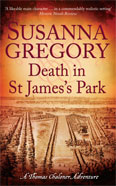 Thomas Chaloner’s Eighth Exploit in Restoration London
Thomas Chaloner’s Eighth Exploit in Restoration London
Five years after Charles II’s triumphant return to London, there is growing mistrust of his extravagant Court and corruption among his officials.
Adding to the beleaguered monarch’s troubles are rumours of an invasion by the Dutch, the sudden appearance of his mistress’s husband, and the ever-present threats of plots either to restore the Commonwealth or to bring back a Catholic ruler. All are gleefully discussed in the coffee houses, and fill them with more steam and stench that rises from their kitchens.
When a cart laden with gunpowder explodes outside the General Letter Office, it is immediately clear that such an act is more than an expression of outrage at the inefficiency of the postal service. As intelligencer to the Lord Chancellor, Thomas Chaloner cannot understand why a man of known incompetence is put in charge of investigating the attack, while he is diverted to make enquiries about the poisoning of birds in St James’s Park. He becomes even more suspicious of his employer’s motives when he discovers that the witnesses he needs to interview had close links to the General Letter Office, where activities are more firmly centred on intercepting people’s mail than delivering it.
Then human rather than avian victims are poisoned, and Chaloner knows he has to ignore his master’s instructions and use his own considerable wits to defeat an enemy whose deadly tentacles reach into the very heart of government: an enemy who has the power and expertise to destroy anyone who stands in the way…
[buyingbuttons3 amazonpaperback=”http://www.amazon.co.uk/Death-St-Jamess-Park-Exploits/dp/0751544337/ref=tmm_pap_title_0″ amazonhardback=”http://www.amazon.co.uk/Death-St-Jamess-Park-Exploits/dp/1847444342/ref=tmm_hrd_title_0″ kindle=”http://www.amazon.co.uk/Death-St-Jamess-Park-ebook/dp/B008MSOO36/ref=tmm_kin_title_0″ waterstones=”http://www.waterstones.com/waterstonesweb/products/susanna+gregory/death+in+st+james27s+park/9550097/” ebook=”http://www.waterstones.com/waterstonesweb/products/susanna+gregory/death+in+st+james27s+park+28ebook29/9541441/” amazonuspaper=”http://www.amazon.com/Death-Jamess-Exploits-Thomas-Chaloner/dp/0751544337/ref=tmm_pap_title_0″ amazonushard=”http://www.amazon.com/Death-Jamess-Exploits-Thomas-Chaloner/dp/1847444342/ref=tmm_hrd_title_0″ kindleus=”http://www.amazon.com/Death-St-Jamess-Park-ebook/dp/B008MSOO36/ref=tmm_kin_title_0″#[/buyingbuttons3]
Extract
Tuesday 10 January 1665
Post House Yard was a pretty square, located just off the busy thoroughfare called Dowgate Hill. It was dominated by the General Letter Office, the place where the country’s mail was received and dispatched. This was a handsome building taxed on thirty-three hearths, although there was a wing at the back that was disused and said to be falling into disrepair. It boasted an elegant stone façade, and five marble steps led up to its imposing front door.
The other buildings in Post House Yard were equally attractive – a row of neat, brightly painted cottages on the right, and the brick-built mansion owned by the eccentric Sir Henry Wood on the left. The square was cobbled with pale pink stones that were kept unusually clean, and someone had planted two long borders with a variety of shrubs and trees.
The two conspirators stood in one of these gardens. It was a clear night, and they could not afford to be seen, so they were grateful for the shadows cast by a spreading yew.
‘I am not sure about this,’ the first muttered unhappily. ‘Gunpowder is so indiscriminate. We might harm a lot of innocent bystanders.’
There was a crackle as the second man fingered a letter. ‘It says here that we should not allow that possibility to discourage us – that there will be casualties in any struggle for justice.’
‘I suppose that is true. When do they want this explosion to take place?’
‘At noon on Thursday.’
The first man stared at his companion’s silhouette, aghast. ‘But that is when the domestic mails are collected! The square will be teeming with people – we might kill dozens of them!’
The second shook his head quickly. ‘Not if it is done properly, and the noise and commotion will work to our advantage. It means that our powder-laden cart is less likely to be noticed, which will increase our chances of success.’
‘I do not like it.’
‘Neither do I, but the situation cannot be allowed to continue. You know this – we have talked of little else for the past four years. Look!’ The second man pointed at the sky. ‘It is the comet. It appeared on the very evening that we received our instructions, and it has grown steadily brighter ever since. It is a sign of God’s approval – what we are doing is right.’
The first man nodded, but he remained uneasy. In two days, the dead would litter Dowgate Hill, and London would never be the same again.

